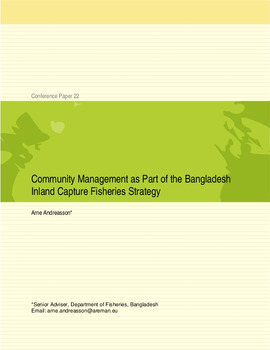Community management as part of the inland capture fisheries strategy in Bangladesh
Abstract
Bangladesh has had comprehensive experience of community based management for inland capture fisheries from several projects (revenue and externally funded) over the last 10 to 15 years. The lessons were extensively used for the elaboration of a strategy and a programme, which will seek to consolidate gains in and expansion of community based management linked to institutional and legal reform and a recognition and strengthening of the roles of civil society and the private sector. The Ministry of Fisheries and Livestock adopted the National Fisheries Strategy in January 2006. It had been developed by the Department of Fisheries over an extended period through a consultative process involving all relevant stakeholders. The strategy sets out to guide the implementation of the National Fisheries Policy, the PRSP and the Road Map for PRSP. The strategy covers eight areas (“sub-strategies”); inland capture fisheries, marine capture fisheries, aquaculture, aquaculture extension, shrimp culture, quality control, human resources development, and monitoring and evaluation. The strategy has a pro-poor focus and guiding principles are people’s participation for community based resource management, decentralization of planning and decision making, conservation and enhancement of fish stocks, protection against habitat destruction, pollution, and degradation of bio-diversity. The strategy emphasizes the need for reform of access rights (lease systems) and institutional development for decentralization and effective public sector service delivery

